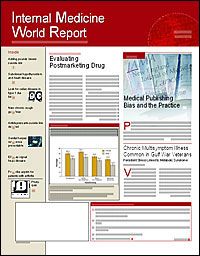Diet Rich in Antioxidants Can Avert Development of AMD
High dietary intake of antioxidants can dramatically lower the risk of developing the most common cause of irreversible blindness in the United States?age-related macular degeneration (AMD)?based on the results of a large study published in the Journal of the Amer?-ican Medical Association (2005; 294:3101-3107).
The Age-Related Eye Disease Study (AREDS) had already established that taking supplements containing from 5 to 13 times the recommended daily allowances of vitamins C and E, beta- carotene, and zinc could mitigate the progression of AMD.
This new study, conducted by Redmer van Leeuwen, MD, PhD, Departments of Epidemiology and Biostatistics, Erasmus Medical Centre, Rotterdam, the Netherlands, and colleagues, was the first to examine the effects of dietary antioxidant intake on the likelihood of developing AMD.
Included were 4170 adults who were at risk of AMD at baseline and who were recruited from the Rotterdam study, a population-based, prospective cohort trial evaluating the frequency and risks of common cardiovascular, locomotor, neurologic, and ophthalmologic disorders. At study entry, all patients had an eye examination and completed a food questionnaire.
Over a mean follow-up of 8 years, 560 of the participants (13.4%) were diagnosed with incident AMD, most of whom qualified for a diagnosis of early-stage AMD (ie, large, soft, distinct drusen with pigment irregularities, or indistinct or reticular drusen with or without pigment irregularities). There were 42 cases of incident late-stage AMD?14 atrophic and 28 neovascular.
Smoking and increased lipid levels were associated with the development of incident AMD. For example, persons who developed incident AMD had more pack-years of cigarette smoking (P = .04) and higher serum high-density lipoprotein cholesterol concentrations (P = .02) than those who did not develop AMD.
After adjusting for energy intake, a significant inverse correlation em?erged between intake of vitamin E, iron, and zinc and the risk of AMD. For each 1 standard deviation increase in intake, risk of AMD was reduced by 8% for vitamin E, by 9% for zinc, and by 5% for iron.
Even though "intake of these nutrients?was considerably lower than the high-dose supplements used in AREDS," the investigators wrote, "an above-median intake of the combination of vitamins C and E, beta-carotene, and zinc was associated with a 35% lower risk of incident AMD."
Of note, the relative risks did not significantly change after excluding the 559 participants who had used antioxidant supplements at baseline or when the high-, middle-, and low-intake groups were stratified by smoking status.
? Vitamin E can be obtained in whole grains, vegetable oil, eggs, and nuts.
? Zinc is found in high concentrations in meat, poultry, fish, whole grains, and dairy products.
The investigators concluded that diet, particularly dietary consumption of foods rich in vitamin E and zinc, may help ward off AMD.
While noting that these data still need to be confirmed, the investigators suggested that their results "may be useful to persons with signs of early AMD or to those with a strong family history of AMD."
